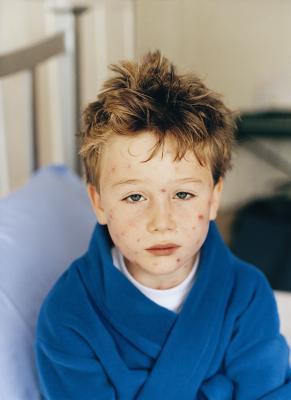An itchy, cranky child with chicken pox puts you on full-time parent patrol until the illness has run its course. According to MayoClinic.Com, if your child is otherwise healthy, her pediatrician may not recommend specific medical treatment. Simple home remedies and a mother’s tender loving care can give your child natural chicken pox relief.
What To Expect
Chicken pox is caused by the varicella-zoster virus (VZV), a virus that can be transmitted to your child through the sneeze or cough of an infected playmate or through direct physical contact with someone who has chicken pox. Chicken pox usually affects healthy children only mildly, according to the Centers for Disease Control and Prevention (CDC), lasting between five to 10 days. Your child will likely need to miss school for five to six days while he recovers. Chicken pox is characterized by itchy, red bumps that typically appear on the face, scalp, back and chest, says MayoClinic.com. Accompanying symptoms can include fever, headache, cough and malaise — all which compound your child’s discomfort.
Prevent Scratching
Chicken pox lesions are unbearably itchy, making it likely that your child will inevitably scratch at the sores. However, MayoClinic.com cautions that scratching can cause infection and scarring. Trim your child’s nails short. Have her wear gloves or mittens when she goes to bed at night.
Soothe the Itch
A natural, soothing solution for itching is a a colloidal oatmeal bath. There are commercial products on the market, but you can also DIY at home. The University of Maryland Medical Center (UMMC) suggests grinding oatmeal until it’s the consistency of fine powder. Use around 2 cups for each bath. For extra relief, the UMMC suggests putting 1/2 to 1 cup baking soda in the bathwater. Both the CDC and the UMMC also advise daubing calamine lotion on the bumps to reduce itching and to keep your child comfortable.
Cautions
Scrambling through the medicine cabinet may be your last resort if your child has a troubling fever. However, the CDC cautions that one thing you should never give your child is aspirin. This over-the-counter medication has been linked to Reye’s syndrome, a severe and potentially fatal disease that affects the liver, brain and other major organs.
Concerns
According to the CDC, only 1 of every 10 children experiences complications serious enough to see a pediatrician. Call a doctor if your child’s fever lasts more than four days or peaks above 102 degrees F. Also, hot, red skin that seeps pus may be a sign of a bacterial infection. As mentioned, chicken pox has a mild effect on children; however, the disease can progress to pneumonia or encephalitis, both of which are serious — and potentially deadly. If your child is very sick — if he appears to be confused, has trouble walking, can’t breathe or can’t stop vomiting — this is cause for alarm. Contact your doctor immediately to discuss treatment options, if you’re pregnant and haven’t had chicken pox or the vaccine for this disease.
Other
The best way to avoid chicken pox is to prevent this childhood illness from afflicting your child. The CDC recommends that all healthy children between the ages of 1 and 12 years of age receive the chicken pox vaccine, as well as teens and adults over the age of 13 who haven’t had chicken pox.





